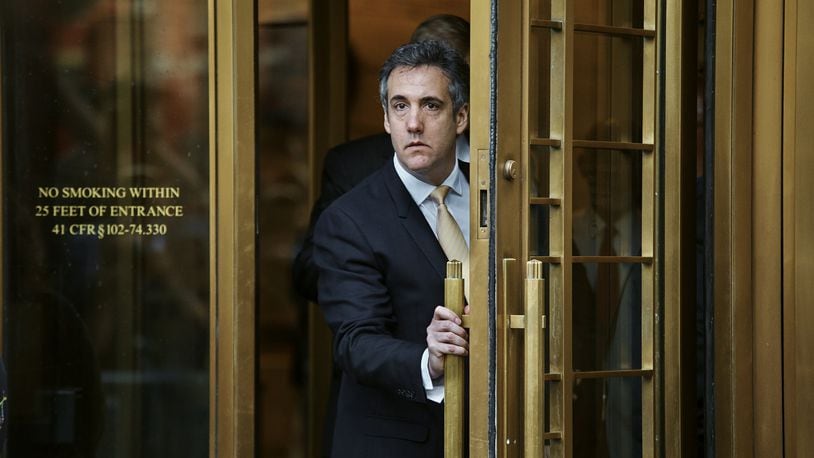On Tuesday, Cohen pleaded guilty to campaign-finance violations. Cohen said Trump directed him to arrange the payments to two women who said they had affairs with Trump, acknowledging the payments were made to influence the election.
Around the same time, a jury found former Trump campaign chairman Paul Manafort guilty of eight financial crimes unrelated to the campaign. It was the first trial victory for prosecutors in the office of special counsel Robert Mueller.
Some questions and answers about the legal implications for Trump of the Cohen and Manafort cases:
Does Cohen’s guilty plea mean Trump violated the law?
Cohen said in a New York court that he made one payment “in coordination and at the direction of a candidate for federal office” and the other “under direction of the same candidate.” The amounts and dates line up with the payments made to porn star Stormy Daniels and Playboy model Karen McDougal.
Prosecutors did not go as far as Cohen did in open court in pointing the finger at the president, saying Cohen acted “in coordination with a candidate or campaign for federal office for purposes of influencing the election.”
Daniel Petalas, former prosecutor in the Justice Department’s public integrity section, said the issue of whether Trump violated the law comes down to whether Trump “tried to influence an election, whether he knew and directed it and whether he knew it was improper.”
But Trump’s attorney Rudy Giuliani said in a statement: “There is no allegation of any wrongdoing against the President in the government’s charges against Mr. Cohen.”
Does Cohen’s plea mean Trump could be forced to submit to questions?
Trump’s lawyers have been negotiating with Mueller about whether the president would submit to an interview as part of the Russia investigation. Now Daniels’ attorney Michael Avenatti says he’ll renew efforts to get Trump to submit to a deposition in a lawsuit Daniels filed to invalidate a nondisclosure agreement she signed ahead of the 2016 election.
The Supreme Court in 1997, ruling in a sexual harassment lawsuit brought by Paula Jones against President Bill Clinton, held that a sitting president could be made to answer questions as part of a lawsuit. But that ruling did not directly address whether a president could be subpoenaed to testify in a criminal investigation, a question the Supreme Court may have to confront if Mueller tries to compel Trump’s testimony in his probe.
If there is evidence of wrongdoing, can Trump be indicted?
The Justice Department’s Office of Legal Counsel, which provides legal advice and guidance to executive branch agencies, has held that a sitting president cannot be indicted.
Trump’s lawyers have said that Mueller plans to adhere to that guidance, though Mueller’s office has never independently confirmed that. There would presumably be no bar against charging a president after he or she leaves the White House.
Could Trump pardon himself?
Courts have never had to answer that question. Giuliani, Trump’s lawyer, has said it won’t come to that.
“Pardoning himself would be unthinkable and probably lead to immediate impeachment,” Giuliani told NBC’s “Meet the Press” in June. “And he has no need to do it, he’s done nothing wrong.” Still, Giuliani argued that Trump “probably does” have the power to pardon himself.
What’s next?
While the Manafort case was part of Mueller’s investigation, the Cohen case was not. It was handled by prosecutors in New York.
Cohen could choose to provide information to New York prosecutors or the special counsel, who is examining the Trump campaign’s possible involvement in Russia’s interference in the 2016 campaign. If Cohen were to substantially assist the special counsel’s investigation, Mueller could recommend a reduction in his sentence. Cohen will be sentenced Dec. 12.
The government has until Wednesday to decide whether it wants to retry the 10 counts against Manafort that were declared a mistrial.
Meanwhile, Manafort faces a second trial on seven more criminal charges next month in Washington.
The special counsel’s office has submitted more than 1,000 possible exhibits of evidence for the second trial, prompting Manafort’s lawyers to ask for an extension to further review the evidence. The charges include money laundering, failure to register as a foreign agent and obstruction of justice.
The New York Times contributed to this story
About the Author
